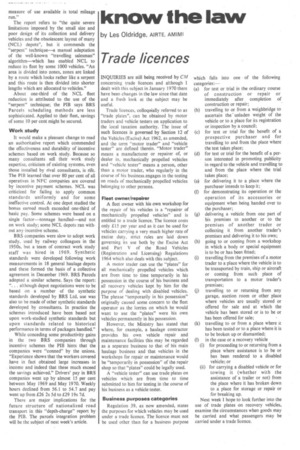know the law
Page 53

If you've noticed an error in this article please click here to report it so we can fix it.
by Les Oldridge, AIRTE, AMIM1
Trade licences
INQUIRIES are still being received by CM concerning trade licences and although I dealt with this subject in January 1970 there have been changes in the law since that date and a fresh look at the subject may be useful.
Trade licences, colloquially referred to as "trade plates", can be obtained by motor traders and vehicle testers on application to the local taxation authority. The issue of such licences is governed by Section 12 of the Vehicles (Excise) Act 1962, as amended, and the term "motor trader" and "vehicle tester" are defined therein. "Motor trader" means a manufacturer or repairer of, or dealer in, mechanically propelled vehicles and "vehicle tester" means a person, other than a motor trader, who regularly in the course of his business,engages in the testing on roads of mechanically propelled vehicles belonging to other persons.
Fleet owner/repairer A fleet owner with his own workshop for the repair of his vehicles is a "repairer of mechanically propelled vehicles" and is entitled to a trade licence. The licence costs only £15 per year and as it can be used for vehicles carrying a very much higher rate of excise duty, strict rules are laid down governing its use both by the Excise Act and Part V of the Road Vehicles (Registration and Licensing) Regulations 1964 which also deals with this subject.
A motor trader can use the "plates" for all mechanically propelled vehicles which are from time to time temporarily in his possession in the course of his business and all recovery vehicles kept by him for the purpose of dealing with disabled vehicles. The phrase "temporarily in his possession" originally caused some concern to the fleet operator as the lorries on which he would want to use the "plates" were his own vehicles permanently in his possession.
However, the Ministry has stated that where, for example, a haulage contractor provides his own vehicle repair and maintenance facilities this may be regarded as a separate business to that of his main haulage business and that vehicles in the workshops for repair or maintenance would be "temporarily in possession" of the repair shop so that "plates" could be legally used.
A "vehicle tester" can use trade plates on vehicles which are from time to time submitted to him for testing in the course of his business as a vehicle tester.
Business purposes categories Regulation 39, as now amended, states the purposes for which vehicles may be used under a trade licence. The licence must not be used other than for a business purpose
which falls into one of the following categories:—
(a) for test or trial in the ordinary course of construction or repair or immediately after completion of construction or repair; (b) travelling to or from a weighbridge to ascertain the' unladen weight of the vehicle or to a place for its registration or inspection by a council;
(0) for test or trial for the benefit of a prospective purchaser and for travelling to and from the place where the test takes place;
(d) for test or trial for the benefit of a person interested in promoting publicity in regard to the vehicle and travelling to and from the place where the trial takes place; (o) for delivering it to a place where the purchaser intends to keep it; (f) for demonstrating its operation or the operation of its accessories or equipment when being handed over to the purchaser; (g) delivering a vehicle from one part of his premises to another or to the premises of another trader or collecting it from another trader's premises and delivering it to his own; (h) going to or coming from a workshop in which a body or special equipment is to be or has been fitted; (i) travelling from the premises of a motor trader to a place where the vehicle is to be transported by train, ship or aircraft or coming from such place of transportation to a motor trader's premises; (j) travelling to or returning from any garage, auction room or other place where vehicles are usually stored or offered for sale and at which the vehicle has been stored or is to be or has been offered for sale; (k) travelling to or from a place where it has been tested or to a place where it is to be broken up or dismantled; (I) in the case or a recovery vehicle (i) for proceeding to or returning from a place where assistance is to be or has been rendered to a disabled vehicle; or (ii) for carrying a disabled vehicle or for towing it (whether with the assistance of a trailer or not) from the place where it has broken down to a place for storage or repair or for breaking up.
Next week I hope to look further into the use of trade plates on recovery vehicles, examine the circumstances when goods may be carried and what passengers may be carried under a trade licence.




































































































